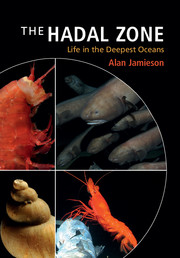Book contents
- Frontmatter
- Dedication
- Contents
- Preface
- Acknowledgements
- Part I History, geology and technology
- Part II Environmental conditions and physiological adaptations
- Part III The hadal community
- Part IV Patterns and current perspectives
- 11 Ecology and evolution
- 12 Current perspectives
- Appendix
- References
- Index
- Plate section
12 - Current perspectives
from Part IV - Patterns and current perspectives
Published online by Cambridge University Press: 05 February 2015
- Frontmatter
- Dedication
- Contents
- Preface
- Acknowledgements
- Part I History, geology and technology
- Part II Environmental conditions and physiological adaptations
- Part III The hadal community
- Part IV Patterns and current perspectives
- 11 Ecology and evolution
- 12 Current perspectives
- Appendix
- References
- Index
- Plate section
Summary
The interesting history of discovery, geological aspects, environmental characteristics, ecology and biology associated with the deepest ecosystem on Earth have been acknowledged by scientists for some time and will continue to affect humankind in the future, in both positive and negative ways. For example, the very nature of the ultra-deep regions of the oceans once fuelled the perception that these trenches would make ideal dumping grounds for pharmaceutical and radioactive waste products (Osterberg et al., 1963; Peele et al., 1981; Lee and Arnold, 1983). Thankfully, this idea is no longer commonplace and has been completely overruled by the contemporary perspectives on conservation and sustainability that now apply to all marine environments.
On a grander scale, recent hypotheses suggest that the subduction process is, in part, involved in the disposal of atmospheric carbon, some of which is derived from human activities (Nozaki and Ohta, 1993). While the significance of this contribution to the planet remains unresolved, the plate subduction process impacts upon the everyday life of the human populations living in close proximity to trenches, often in highly negative ways. Ultimately, trench sites are the origin of the devastating earthquakes and tsunamis that have the power to deliver mass death and destruction without warning.
- Type
- Chapter
- Information
- The Hadal ZoneLife in the Deepest Oceans, pp. 266 - 284Publisher: Cambridge University PressPrint publication year: 2015

